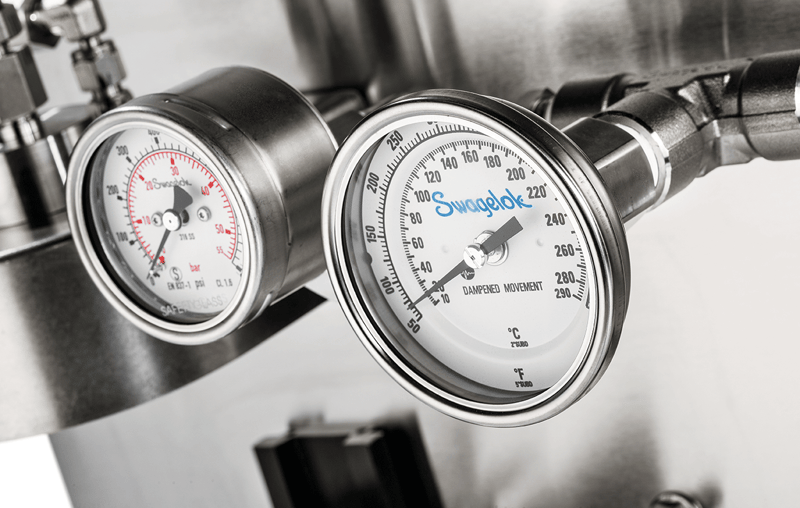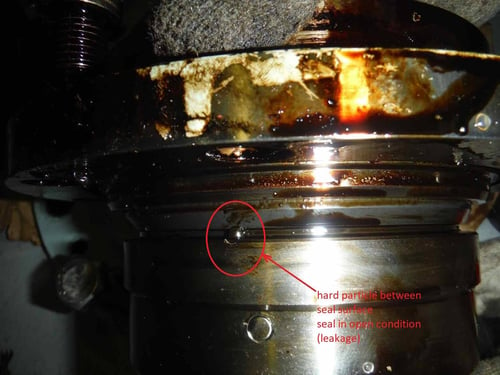Share this
Mechanical Seal Support Failure Causes—And What You Can Do About Them
by Paul Lesnau on 10/20/20 8:45 AM

One of your guys found a leak. Whether it was a whiff in the air or a puddle on the ground, this is not good news—especially in the highly-regulated Northern California Bay Area. If you’re lucky, the leakage is small, though noticeable, and you can remedy it before it brings a critical pumping process to a halt. In the worst case, it’s catastrophic, with ramifications of sanctions from Cal/OSHA or the BAAQMD. What can you do to prevent these situations? After all, aren’t seal support systems supposed to enhance pump reliability?
I’ve worked to prevent mechanical seal support failure causes with process and reliability engineers for many years and it usually comes down to one of two major factors: changes in process conditions and the inability to maintain the required seal chamber temperature. Let’s look at each of these, acknowledging that there’s often interplay among the variety of seal support systems, mechanical seals, and pumping processes involved.
2 Major Causes of Mechanical Seal Support Failure
Have Pumping Process Conditions Changed Significantly?
It’s not unusual for pumping process conditions to change during the course of a pump’s life. Pumps installed years ago were likely designed for a specific purpose. In the ensuing years, with changes to accommodate a demand for product variations or attempts to boost process productivity or efficiency, mechanical seals and seal support systems may no longer be able to adequately support the pump. I’ve listed key factors to consider in the table below.
Mechanical Seal Support Failure Causes Attributable to Process Changes
| Factor | Remedy |
| Change to process fluid running at higher temperatures |
|
| Increased particulates in process fluid abrade seal faces |
|
| Increased or decreased pumping pressure |
|

As you might expect, pumps, mechanical seals, and seal support systems need to be carefully matched to avoid mechanical seal support failure. Changes in process conditions can quickly upset the balance required to ensure pump reliability.
Maintaining the Proper Seal Chamber Temperature Is Critical
Excessive seal chamber temperatures are virtually guaranteed to result in mechanical seal failures that lead to leakage. I’ve addressed temperature factors associated with changes to process conditions above. Now let’s focus on problems tied to a mechanical seal support system’s failure to maintain the proper seal chamber temperature. In these scenarios, there have been no changes to the process fluid. The problem lies within the seal support system. Here are the most common problems to consider:
Mechanical Seal Support Failure Causes Attributable to Temperature and Flow
| Factor | Remedy |
| Current cooling capacity of the process fluid is inadequate |
|
| Inadequate barrier or buffer fluid flow rate |
|
| Coking, icing, or oxidation on the atmospheric side of seal faces |
|
For any of these systems, pinched, crimped, or leaking tubing that conveys cooling fluid can also be the culprit. Temperature and flow are closely related. It can be difficult to determine if a mechanical seal support failure cause is one or both of these factors. Begin by identifying or ruling out the simplest problems to fix. In the simplest case, it’s merely a control adjustment to an external source to restore the proper flow of cooling fluid. In more complicated cases, a design improvement may be the only way to eliminate a continually recurring problem.
Don’t Try to Figure Out Mechanical Seal Support Failure Causes On Your Own
Although a few of these mechanical seal support failure causes can be quickly diagnosed and resolved, solving the more complex problems requires the expertise and experience of a seal support system vendor with deep industry knowledge.
A local partner like Swagelok will help you diagnose your mechanical seal support failure causes, on-site. Whether the recommendation is as simple as a heat exchanger upgrade or a redesign and replacement of an outdated seal support system, you’ll benefit from the expertise of a team of field engineers and technicians certified in ISO 9001. There’s no better partner in Northern California to provide you with a full range of services, including consulting, design, fabrication, testing, training, and on-going technical support.
To find out more about how Swagelok Northern California can help you diagnose and solve the most common mechanical seal support failure causes by providing expert consultation and Assembly Services, contact our team today by calling 510-933-6200.
 About Paul Lesnau | Sales Manager, Business Development Manager, and Field Engineer
About Paul Lesnau | Sales Manager, Business Development Manager, and Field Engineer
Paul holds a B.S. in Mechanical Engineering from North Dakota State University. Before joining Swagelok Northern California, he was the West Coast Regional Sales Manager for an organization focused within the pneumatic and hydraulic industry where he supervised product distribution throughout the western United States, Canada, and Mexico. While in this role, he was able to help provide technical and application-specific expertise to customers and distribution to drive specifications.
Share this
- Archive (465)
- Assembly Services (207)
- About (100)
- Seal Support Systems (96)
- Best Practices (88)
- Training Services (74)
- Fittings (51)
- Semiconductor Applications (49)
- Hoses and Flexible Tubing (47)
- Regulators (44)
- Tubing (42)
- Grab Sampling Systems (32)
- Sampling Systems (32)
- Gas Systems (30)
- Services (30)
- Downloads (29)
- Valves (24)
- Application Support (18)
- Orbital Welding (17)
- Case Studies (13)
- Steam Systems (13)
- Frequently Asked Questions (12)
- Tools (12)
- Measurement Devices (7)
- Subsystems (6)
- Thermal Management (6)
- September 2023 (1)
- August 2023 (2)
- June 2023 (1)
- March 2023 (3)
- February 2023 (3)
- January 2023 (4)
- December 2022 (4)
- November 2022 (4)
- October 2022 (4)
- September 2022 (1)
- August 2022 (3)
- July 2022 (2)
- June 2022 (4)
- May 2022 (1)
- April 2022 (2)
- March 2022 (1)
- February 2022 (2)
- January 2022 (3)
- December 2021 (1)
- November 2021 (6)
- October 2021 (6)
- September 2021 (8)
- August 2021 (4)
- July 2021 (3)
- June 2021 (6)
- May 2021 (6)
- April 2021 (7)
- March 2021 (5)
- February 2021 (4)
- January 2021 (6)
- December 2020 (5)
- November 2020 (6)
- October 2020 (6)
- September 2020 (8)
- August 2020 (7)
- July 2020 (8)
- June 2020 (8)
- May 2020 (6)
- April 2020 (9)
- March 2020 (7)
- February 2020 (10)
- January 2020 (21)
- December 2019 (23)
- November 2019 (21)
- October 2019 (22)
- September 2019 (21)
- August 2019 (22)
- July 2019 (23)
- June 2019 (20)
- May 2019 (23)
- April 2019 (22)
- March 2019 (21)
- February 2019 (20)
- January 2019 (21)
- December 2018 (14)
- November 2018 (19)
- October 2018 (23)
- September 2018 (17)
- August 2018 (29)
- July 2018 (11)
- June 2018 (6)
- May 2018 (5)
- April 2018 (4)
- March 2018 (5)
- February 2018 (3)
- January 2018 (3)
- December 2017 (2)
- November 2017 (4)
- October 2017 (3)
- September 2017 (2)
- August 2017 (6)
- July 2017 (4)
- June 2017 (4)
- May 2017 (4)
- April 2017 (3)
- March 2017 (4)
- February 2017 (3)
- January 2017 (3)
- December 2016 (3)
- November 2016 (3)
- October 2016 (3)
- September 2016 (5)
- August 2016 (5)
- July 2016 (4)
- June 2016 (5)
- May 2016 (3)
- April 2016 (4)
- March 2016 (5)
- February 2016 (11)
- January 2016 (1)
- December 2015 (3)
- November 2015 (4)
- October 2015 (3)
- September 2015 (4)
- August 2015 (4)
- July 2015 (8)
- June 2015 (5)
- May 2015 (3)
- April 2015 (4)
- March 2015 (4)
- February 2015 (3)
- January 2015 (4)
- December 2014 (2)
- November 2014 (3)
- October 2014 (4)
- September 2014 (4)
- August 2014 (4)
- July 2014 (5)
- June 2014 (4)
- May 2014 (4)
- April 2014 (5)
- March 2014 (4)
- February 2014 (3)
- January 2014 (4)
- December 2013 (5)
- November 2013 (3)
- October 2013 (4)
- September 2013 (3)
- August 2013 (5)
- July 2013 (5)
- June 2013 (5)
- May 2013 (3)
- April 2013 (6)
- March 2013 (4)
- February 2013 (4)
- January 2013 (8)
- December 2012 (4)
- November 2012 (6)
- October 2012 (6)
- September 2012 (4)
- August 2012 (4)
- July 2012 (4)
- June 2012 (4)

.webp?width=210&height=70&name=StickyLogo%20(5).webp)